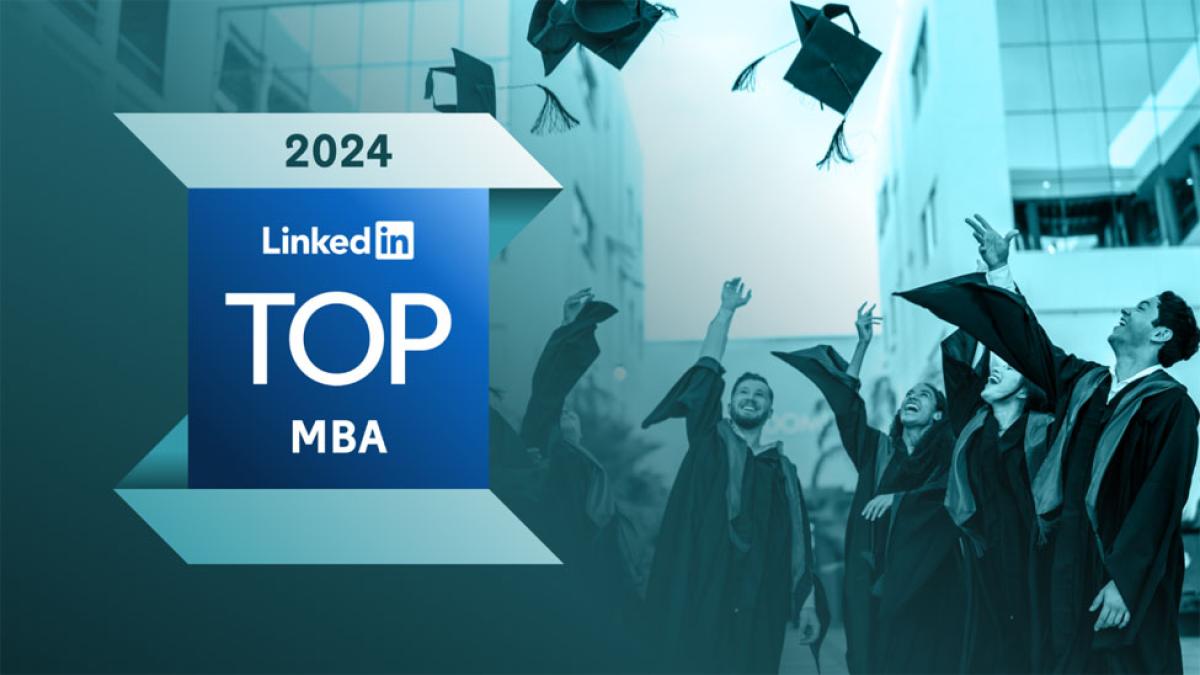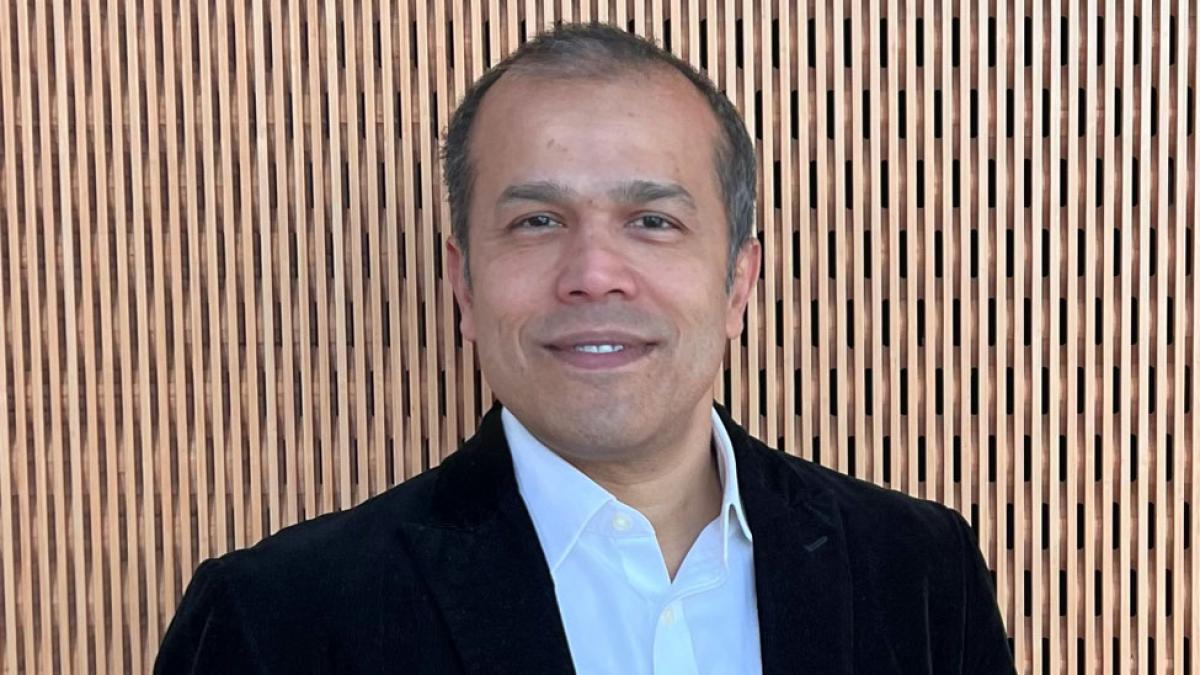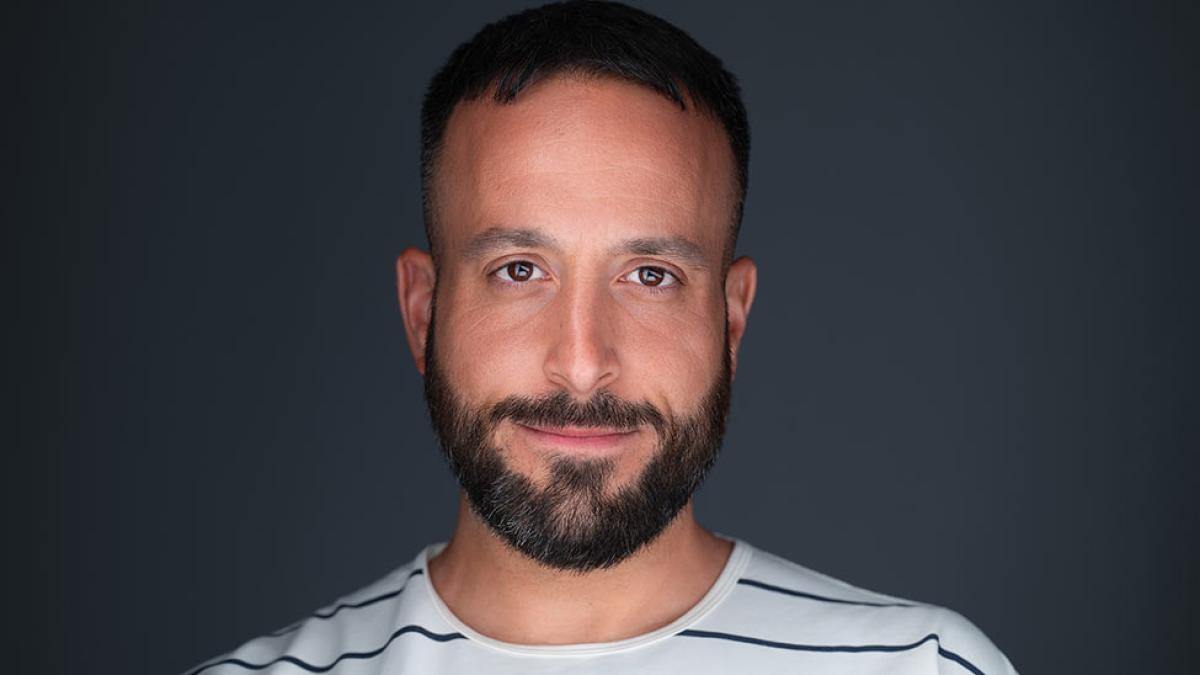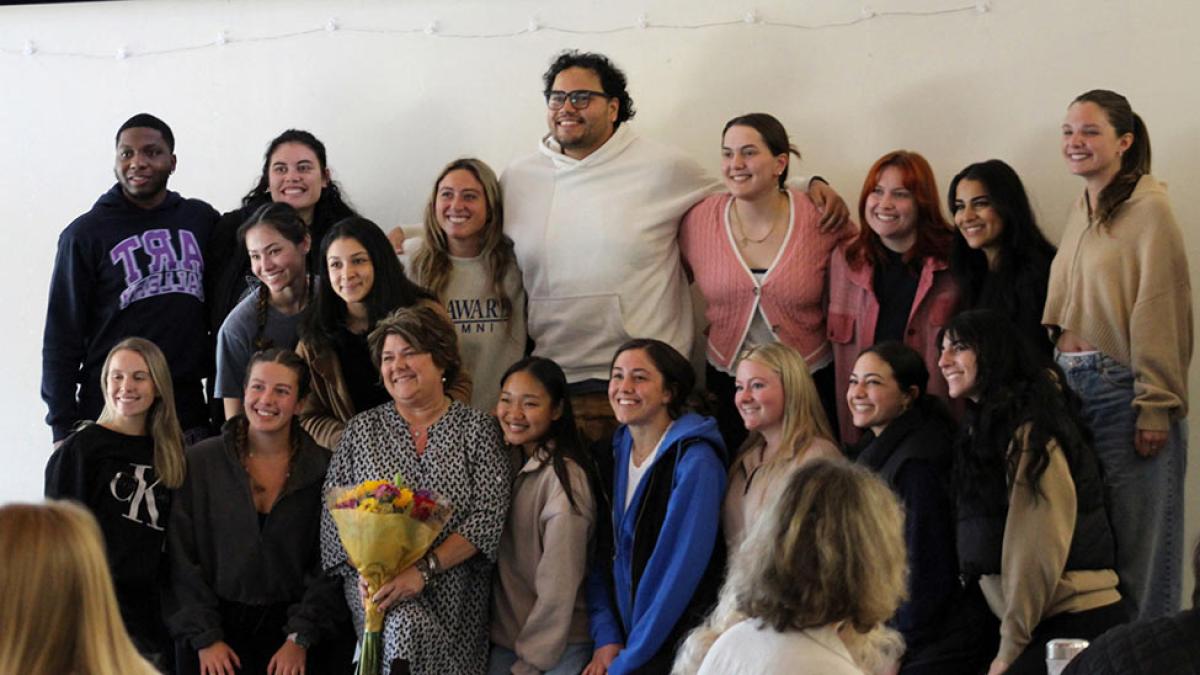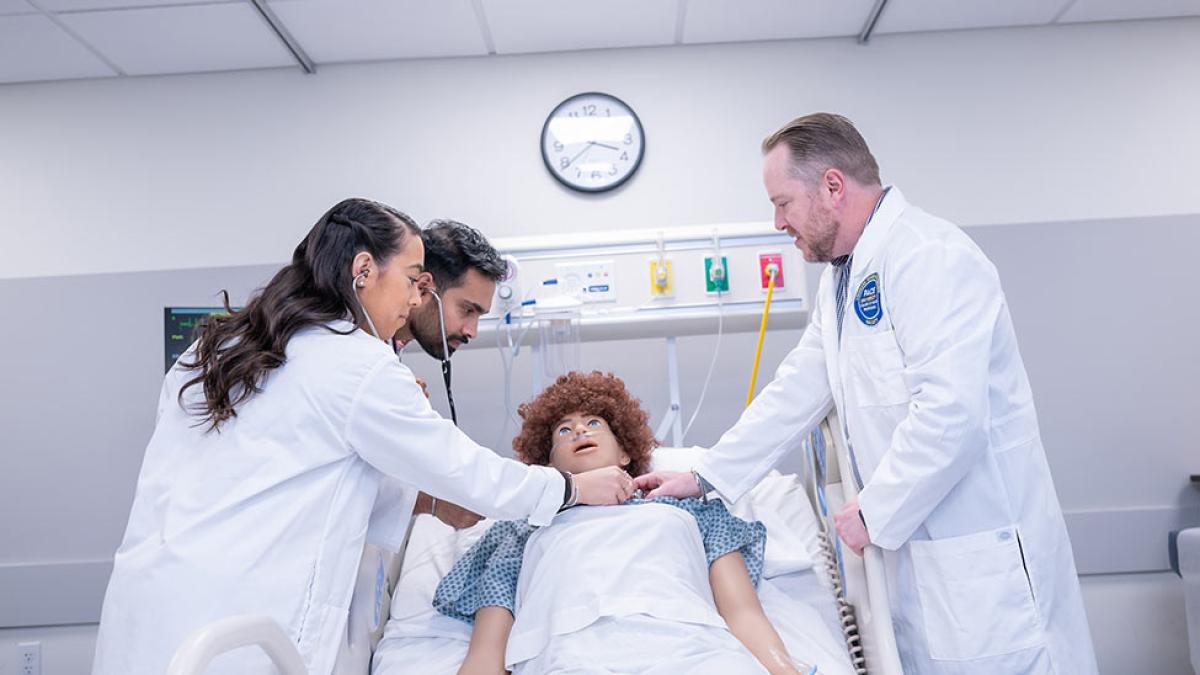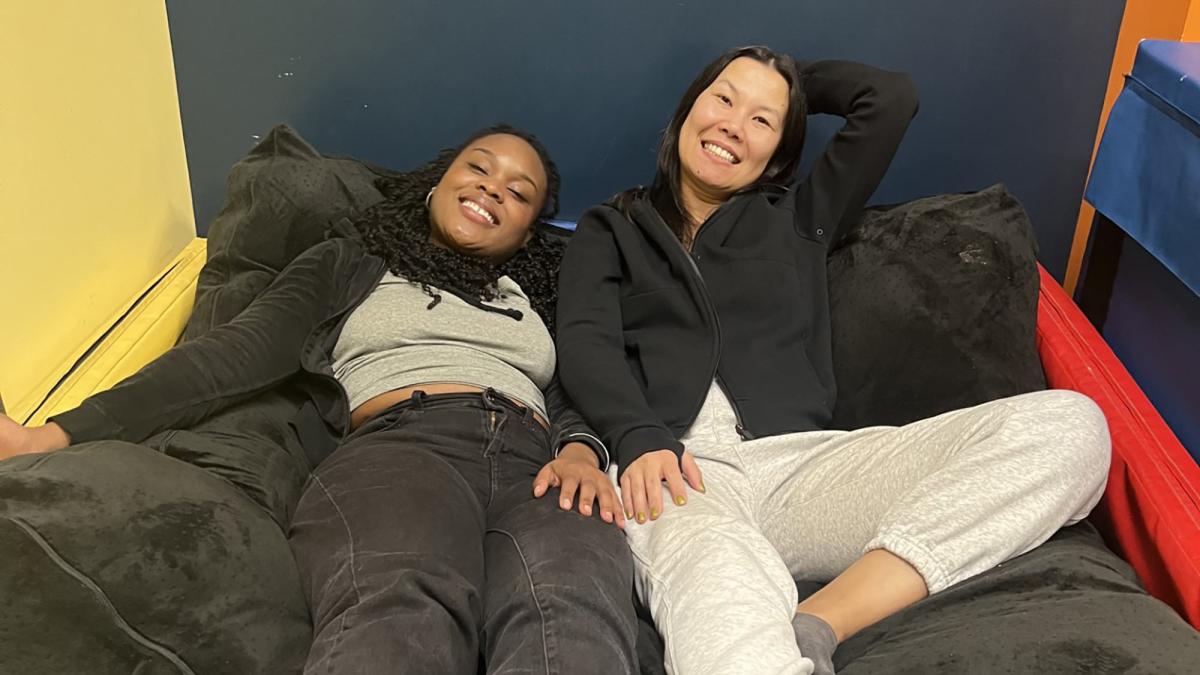The Lubin School of Business has been selected as one of LinkedIn's Top 100 MBA Programs Worldwide to Grow Your Career. This international ranking recognizes our dedication to student outcomes and to empowering the next generation of business leaders in today's rapidly evolving workforce.
10 Best Paying Business Master’s Degrees to Consider
This guide highlights top business master’s degrees, each designed to provide the skills and knowledge that employers value most. Whether you’re a recent graduate or an experienced professional, these programs can open doors to influential roles and provide a pathway to long-term career growth.
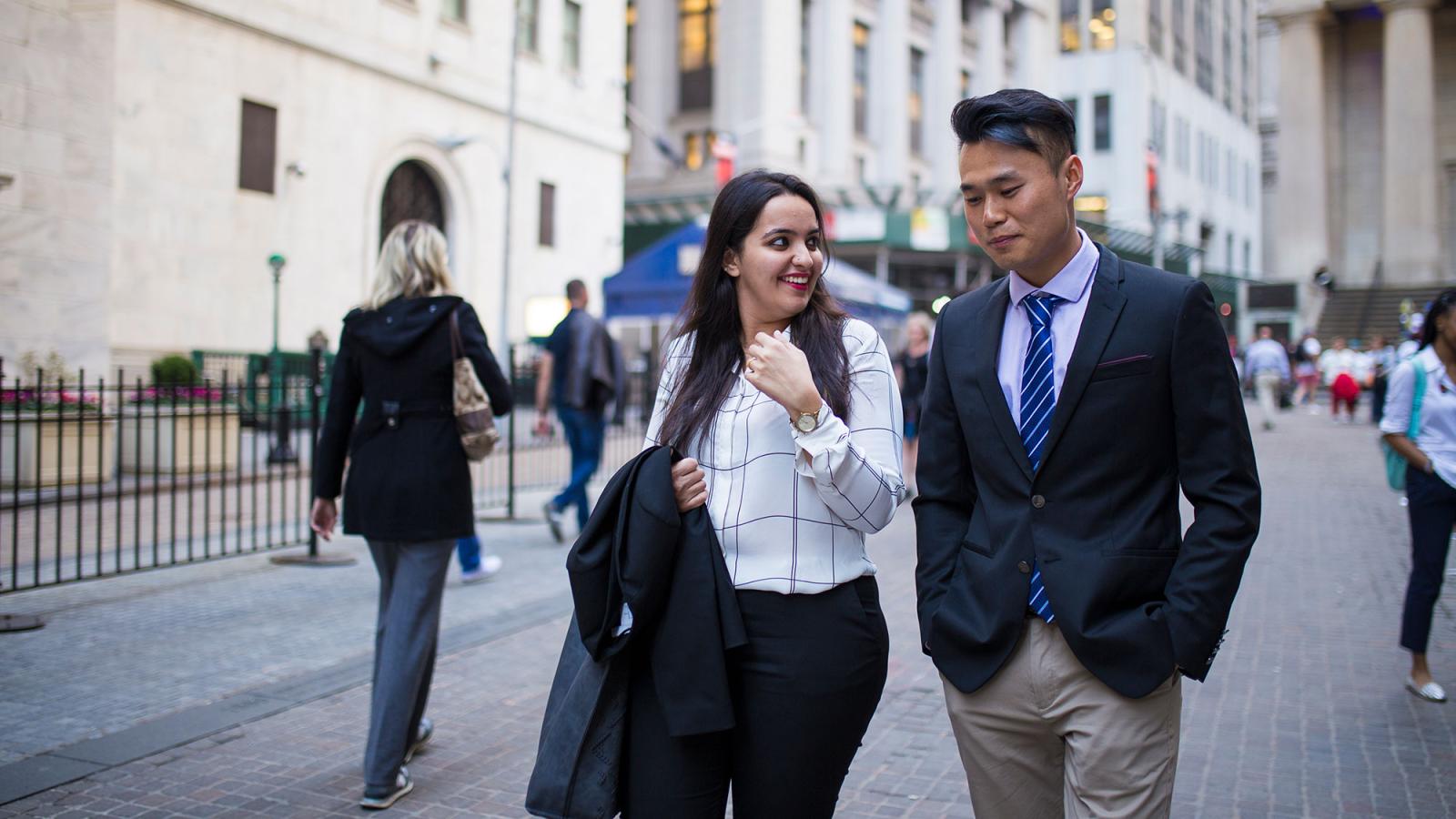
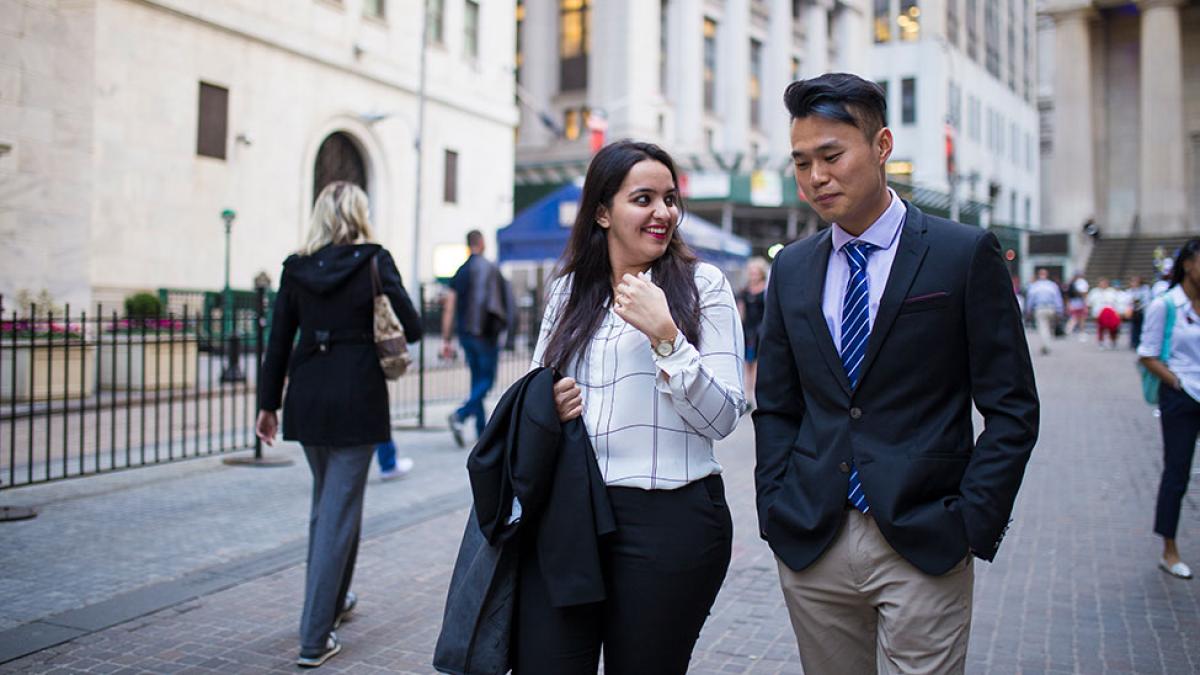
For those looking to accelerate their careers in business, a graduate degree offers significant advantages, including specialized expertise and enhanced leadership skills. With fields such as finance, data analytics, and human resource management in high demand, master’s programs in these areas equip students with the qualifications needed for some of the highest-paying roles in business.
This guide highlights top business master’s degrees, each designed to provide the skills and knowledge that employers value most. Whether you’re a recent graduate or an experienced professional, these programs can open doors to influential roles and provide a pathway to long-term career growth.
What is a Master of Science Degree in Business?
A Master of Science (MS) degree in business is a graduate-level program that provides an in-depth focus on a specialized area within the field, such as finance, data analytics, or human resources. Unlike an MBA, which offers a broad, generalist approach to business education, an MS degree typically dives deeper into technical skills, analytical methods, and field-specific knowledge. These programs often attract individuals who are looking to develop expertise in a particular area of business, preparing them for roles that require advanced technical skills and subject matter expertise.
MS programs generally range from one to two years of full-time study and are tailored to the needs of the modern business world, emphasizing data-driven decision-making, leadership, and adaptability. With the growing emphasis on specialization in many industries, an MS degree can be an asset for professionals aiming to stand out in their field.
What are the benefits of earning a graduate degree in business?
Earning a graduate degree in business can provide valuable benefits for those focused on career advancement and skill specialization. Here are some of the main advantages:
- Expanded career opportunities: Graduate business degrees often open doors to senior management and leadership roles that may be challenging to access with only a bachelor’s degree. An advanced degree can accelerate your career growth and lead to executive positions.
- Increased earning potential: Many business sectors—especially finance, analytics, and management—offer significant salary increases for those with graduate degrees. In competitive job markets, having an advanced credential can make a meaningful difference in your earning potential.
- Networking and mentorship: Graduate programs often offer unique opportunities for networking, mentorship, and partnerships with business leaders. Building relationships with industry professionals, faculty, and fellow students can provide support and guidance throughout your career.
- Skill development and specialization: Business master’s programs are designed to help students develop expertise in specific areas, from risk management to marketing analytics. This focus allows you to build high-value skills that align with your career goals and the demands of today’s job market.
- Global perspective and practical experience: Many programs integrate case studies, internships, and real-world projects, giving students hands-on experience. The opportunity to work with a diverse cohort of students and faculty can broaden your perspective and approach to business challenges.
What are the best-paying graduate business degrees?
If you’re ready to take your career to the next level and unlock new opportunities, then choosing a high-paying graduate business degree can be a powerful step forward. Each program highlighted here can lead to impactful and rewarding roles by equipping you with specialized, high-demand skills. Whether you’re passionate about finance, data analytics, or strategic management, these degrees offer a clear path toward meaningful work and a promising future.
1. Business Administration, BBA/MBA and MBA/JD (Dual Degree Options)
The BBA/MBA and MBA/JD are among the best business master’s degrees for students seeking comprehensive expertise in business and law.
The combined BBA/MBA program offers a streamlined path for students to earn both undergraduate and graduate business degrees, ideal for those aiming to gain comprehensive business expertise in a shorter time frame. The MBA/JD program allows students to combine advanced business education with a legal degree, providing them with versatile skills suited for leadership in complex industries that require business acumen and legal insight.
At Pace University, dual degree options such as the BBA/MBA and MBA/JD provide a fast-tracked educational path. In the BBA/MBA program, students complete 108 undergraduate credits before progressing to a 39-credit MBA, with a choice of 11 undergraduate majors and 11 MBA concentrations. The MBA/JD, in partnership with Pace’s Elisabeth Haub School of Law, allows students to earn both degrees in just four years, blending critical business and legal education.
| Degree Requirements | BBA/MBA: 147 credits, including 108 undergraduate and 39 graduate credits. Undergraduate students must choose a graduate concentration outside their undergraduate major. MBA/JD: Coursework in law and business, with a combined curriculum that allows completion of both degrees in four years (versus five years if taken separately). |
| Program Duration | Typically 5 years for the BBA/MBA combined program, and 4 years for the full-time MBA/JD program |
| Curriculum | BBA/MBA core courses: Business analytics, Finance, Leadership, and Strategy, with options to specialize in areas such as Marketing Analytics, Corporate Finance, or Talent Management. MBA/JD core courses: Law and Business Administration with reciprocal course recognition, including Legal Practice, Business Strategy, and Ethics. |
| Career Paths | Business analyst, corporate lawyer, financial consultant, operations manager, corporate executive |
| Average Annual Salary | |
| Job Growth Outlook (2023–2033) | Operations Manager: Among top executives career path, 6% (Faster than average) Corporate Lawyer: Among lawyer career path, 5% (As fast as average) |
2. Accounting Data Analytics and Technology, MS
The MS in Accounting Data Analytics and Technologies stands out as one of the best graduate degrees for business majors interested in finance and data, integrating traditional accounting with data science and preparing students for roles in auditing, financial analysis, and forensic accounting, where skills in big data, ERP systems, and AI are essential.
Pace University’s program emphasizes practical training and CPA preparation in partnership with Becker Professional Education, with both one-year and two-year track options available. The curriculum is aligned with the “Core + Disciplines” CPA exam model, allowing students to specialize while covering essential accounting skills.
| Degree Requirements | One-Year Track: 30-44 credits including core accounting and data science courses Two-Year Track: 57-63 credits with an extended curriculum in financial reporting, auditing, cost management, and analytics |
| Program Duration | 1-2 years |
| Curriculum | Core Courses: Business Analytics, Database Management, Advanced Auditing, and Strategic Cost Management. Specialization Courses: Contemporary Accounting Issues, Analytics for Fraud Detection. Electives: Forensic Accounting, International Accounting, Accounting Internship. |
| Career Paths | Data-driven accountant, financial analyst, internal auditor, compliance manager |
| Average Annual Salary | Accounting Data Analyst: $90,642 |
| Job Growth Outlook (2023–2033) | Among management analyst careers, 11% (Much faster than average) |
3. Accounting, Public Accounting, CPA Prep, MS
The MS in Accounting provides comprehensive training in financial accounting, regulatory compliance, and auditing, equipping students for diverse careers in public accounting, tax preparation, and management consulting. With a curriculum designed to meet CPA standards, the MS in Accounting ranks among the best masters degrees in business for those pursuing public accounting.
Pace University’s program holds dual AACSB accreditation in both accounting and business and includes CPA preparation with Becker CPA Review, ensuring graduates are well-prepared for the CPA exam and professional roles
| Degree Requirements | 50 credits, with waivers available based on prior coursework |
| Program Duration | 1-2 years |
| Curriculum | Core Courses: Financial Accounting, Business Law for CPA Majors, Taxation of Entities. Specialization Courses: Auditing, Advanced Auditing Practices, Modeling of Accounting Information Systems. Electives: Forensic Accounting, Strategic Cost Management, Accounting Internship. |
| Career Paths | CPA, tax advisor, audit manager, forensic accountant |
| Average Annual Salary | Accountant: $68K - $112K |
| Job Growth Outlook (2023–2033) | Among accountants and auditors, 6% (Faster than average) |
4. Business Analytics, MBA
An MBA in Business Analytics is one of the best master's degrees for business professionals looking to make data-driven decisions in any industry. It combines business strategy with technical skills in data analytics, preparing graduates for data-driven roles in finance, marketing, consulting, and risk management.
Pace University’s program allows students to tailor their studies with electives in predictive analytics, decision modeling, and visual analytics. Full-time and part-time options provide flexibility for working professionals.
| Degree Requirements | 39 credits, with 30 credits in core business and 9 credits in analytics electives |
| Program Duration | 1-2 years |
| Curriculum | Core Courses: Business Economics, Financial Accounting, Business Analytics and Statistics, Managing Operations and Projects Analytics Electives: Predictive Analytics, Visual Analytics, Decision Modeling Capstone: Strategic Decisions |
| Career Paths | Data analyst, financial engineer, risk manager, management consultant |
| Average Annual Salary | Management Analyst: $108,860 |
| Job Growth Outlook (2023–2033) | Among management analysts, 11% (Much faster than average) |
5. Entrepreneurship, General MBA
A General MBA with an Entrepreneurship focus provides a solid foundation across business disciplines and includes electives in finance, marketing, and innovation, making it ideal for aspiring entrepreneurs.
Pace’s flexible MBA program offers access to NYC’s entrepreneurial ecosystem, extensive alumni network, and faculty expertise, helping students build practical skills and valuable connections.
| Degree Requirements | 39 credits, including 30 credits in core business courses, 9 elective credits, and a 3-credit capstone project |
| Program Duration | 1-2 years |
| Curriculum | Core Courses: Business Economics, Financial Accounting, Business Analytics, Leading and Managing Teams Electives: Options in New Product Development, Entrepreneurial Finance, Strategic Marketing Capstone: Strategic Decisions |
| Career Paths | Entrepreneur, startup founder, business consultant |
| Average Annual Salary | Entrepreneur: $301,984 |
| Job Growth Outlook (2018–2028) | 6% (Faster than the average) |
6. Finance, Corporate Finance, MBA
The MBA in Corporate Finance is designed to prepare students for strategic financial roles in industries ranging from manufacturing to financial institutions, where they can drive company profitability and manage risk. This program is widely considered one of the best business masters degrees for careers in financial strategy and corporate leadership.
Pace’s Corporate Finance MBA offers a flexible online or on-campus format, with electives in corporate finance strategy, valuation, and behavioral finance, leveraging the opportunities of New York’s financial hub.
| Degree Requirements | 39 credits, with 30 credits in core business and 9 credits in finance electives |
| Program Duration | 1-2 years |
| Curriculum | Core Courses: Business Economics, Financial Accounting, Business Analytics, Global Business, Ethics, and Social Responsibility Finance Electives: Valuation of the Firm, Advanced Corporate Finance, Behavioral Finance Capstone: Strategic Decisions |
| Career Paths | Financial manager, risk analyst, investment banker, corporate finance director |
| Average Annual Salary | Investment Banking Analyst: $247,438 |
| Job Growth Outlook (2023–2033) | Among financial managers, 17% (Much faster than average) |
7. Financial Operations and Technology, MS
The MS in Financial Operations and Technology is one of the best master's degrees in business for students interested in mastering fintech innovations. It offers a comprehensive focus on investment management and corporate financial management, financial products, and the operation of financial markets.
Pace’s STEM-designated program is designed to prepare graduates for roles in the management of technology, especially careers in securities trading, portfolio management, banking, payment services, credit services, and insurance.
| Degree Requirements | 30–33 credits, with preliminary skill courses, core courses, electives, and a capstone course |
| Program Duration | 1.5–2 years |
| Curriculum | Core Courses: Business Analytics and Statistics, Introduction to Financial Decision Making, Data Science for Business Advanced Courses and Electives: Predictive Analytics, Supportive Technologies for Blockchain Applications, Financial Technology in the Firm and in the Economy, Operations of Financial Markets, Entrepreneurial Finance Capstone Course: Financial Technology: Applications and Evaluation |
| Career Paths | Financial systems manager, fintech product manager, compliance officer, credit risk manager, banking operations manager, financial software engineer |
| Average Annual Salary | Financial Systems Manager: $199,000 |
| Job Growth Outlook (2023–2033) | Among financial managers, 15% (much faster than average) |
8. Human Resources Management, MS
For those aiming to specialize in HR, the MS in Human Resources Management is among the best graduate degrees for business majors focused on talent management. This degree prepares students for strategic roles in talent acquisition, compensation, and workforce planning, equipping them to manage organizational talent effectively.
Pace’s program aligns with SHRM standards, waiving the GMAT/GRE requirement for applicants with three years of HR experience, and includes courses in HR analytics and employment law.
| Degree Requirements | 30 credits, including foundation, HRM electives, research, and labor relations courses |
| Program Duration | 1-2 years |
| Curriculum | Core Courses: Leading & Managing Teams, Human Resources Management, Negotiations & Bargaining Electives: Strategic HR Management, Talent Management, Recruitment and Staffing Research Courses: HR Analytics, Research Methods in Management. |
| Career Paths | HR manager, talent acquisition director, compensation specialist, labor relations consultant |
| Average Annual Salary | HR Manager: $103,518 |
| Job Growth Outlook (2023–2033) | 6% (Faster than average) |
9. Information Systems, MS/MBA
The MBA in Information Systems provides expertise in managing technology within organizations, covering areas such as systems analysis, IT project management, and database administration.
Pace’s STEM-designated program combines IT skills with core business coursework, offering students hands-on experience and NYC internships for practical knowledge.
| Degree Requirements | 39 credits, including 30 core business credits, 9 IT elective credits, and a 3-credit capstone |
| Program Duration | 1-2 years |
| Curriculum | Core Courses: Business Economics, Financial Accounting, Business Analytics, Leading Teams IT Electives: Database Management Systems, Systems Design and Development, Project and Change Management Capstone: Strategic Decisions |
| Career Paths | CIO, IT director, systems analyst, technology consultant |
| Average Annual Salary | Information Systems Manager: $174,953 |
| Job Growth Outlook (2023–2033) | 17% (Much faster than average) |
10. Marketing Analytics, MS
An MS in Marketing Analytics provides students with expertise in using data to drive marketing strategy, preparing them for roles that focus on customer insights, predictive analytics, and digital marketing.
Pace’s program leverages NYC’s marketing industry, with hands-on training in SAS and data mining, and connects students to industry professionals through internships and faculty expertise.
| Degree Requirements | 30-36 credits, including preliminary skills, core courses, and electives |
| Program Duration | 1-1.5 years |
| Curriculum | Core Courses: Value Creation, Marketing Research, Predictive Analytics, Customer Intelligence Electives: Consumer Behavior, Visual Analytics, Marketing Internship |
| Career Paths | Marketing analyst, customer insights manager, digital strategist, brand manager |
| Average Annual Salary | Marketing Manager: $114,595 |
| Job Growth Outlook (2023–2033) | 8% (Faster than average) |
*Note: Salary information sourced in November 2024. Salaries may vary based on geographic location, company, years of experience, and other factors.
How to Apply for a Graduate Degree in Business
Applying for a graduate business program requires careful planning and preparation. Here are some key steps to help applicants navigate the process effectively:
- Define your career goals: Start by clarifying your long-term career goals and the skills you need to acquire. Determining which degree aligns best with these objectives will help guide your choice
- Research programs thoroughly: Look for programs that match your interests and professional needs. Consider factors such as curriculum, faculty expertise, program flexibility (full-time, part-time, or online options), and available resources.
- Prepare for GMAT/GRE (if required): Many business schools require standardized tests such as the GMAT or GRE. These tests assess analytical, quantitative, and verbal skills that are critical in business studies. However, some programs may offer test waivers based on professional experience or undergraduate GPA.
- Gather letters of recommendation: Strong recommendations can enhance an application by showcasing leadership, teamwork, and professional achievements. Choose individuals who know your work well and can speak to your strengths.
- Network with alumni and current students: Connecting with alumni or current students can provide valuable insights into program culture, expectations, and career outcomes. Many universities offer formal and informal networking events for prospective students.
- Submit a compelling personal statement: Highlight your professional journey, achievements, and reasons for pursuing the degree. A well-crafted statement can distinguish your application and demonstrate a strong fit for the program.
Choosing a high-paying business master’s degree is a significant step toward a fulfilling and financially rewarding career. Whether you’re interested in the broad leadership focus of an MBA or the technical expertise of a specialized MS program, these degrees are designed to help you achieve your professional goals. Each program offers unique career paths, competitive salaries, and strong job growth outlooks, making them smart investments for the future.
If you’re ready to take the next step, explore the business master’s programs at Pace University’s Lubin School of Business. With tailored curriculum options and industry-relevant training, these programs provide the skills and knowledge to succeed in today’s competitive business environment. Reach out to Pace today for more information and guidance on fulfilling your education goals.
FAQ
What master’s degree is best for business?
The best master’s degree for business depends on individual career goals. An MBA is ideal for those seeking a broad foundation in business management and leadership. For those aiming to specialize, business degrees in fields such as finance, data analytics, and marketing provide focused expertise and are highly valued in today’s job market.
Which master’s degree is most in demand in business?
Currently, master’s programs in data analytics, financial management, and marketing analytics are in high demand. With the increasing role of data and technology in decision-making, these specialized degrees offer strong career opportunities and competitive salaries.
What is the most successful business degree?
Success varies by career path, but MBAs are often regarded as the most versatile and widely recognized business degree. Specialized MS degrees, however, are essential for roles that require specific technical expertise, such as financial analysts or data scientists.
What is the most profitable master’s degree?
Degrees such as an MBA, MS in Financial Management, and MS in Marketing Analytics are among the most profitable due to high earning potential and strong demand in industries like finance, consulting, and technology.
Which master’s has the highest salary?
Master’s programs in corporate finance, data analytics, and risk management often yield the highest salaries due to their specialized focus and relevance to high-stakes industries. Many graduates in these fields see six-figure starting salaries with the potential for further growth.
More From Pace
With over two decades at the Lubin School of Business, Professor Noushi Rahman brings a dynamic approach to teaching and research. From corporate strategy and AI in business to social responsibility and misconduct, his work equips students with critical thinking skills and practical expertise to thrive in today’s complex business world.
Andrew Neiderman ’09 joins us on The Lubin Link podcast to share his journey from a Pace student with big ideas to a successful entrepreneur in marketing and media production.
Environmental Law Scholar Professor Anthony Moffa Delivers Annual Lloyd K. Garrison Lecture on Environmental Law
Professor Anthony Moffa delivered the Annual Lloyd K. Garrison Lecture on Environmental Law on Thursday, April 3 on "Back to the Future for Climate Liability." The Lloyd K. Garrison Lecture on Environmental Law was established in memory of Lloyd K. Garrison in 1995. Professor Anthony Moffa currently serves as a Haub Visiting Scholar at the Elisabeth Haub School of Law at Pace University. He is also a Professor and Associate Dean for Innovation at University of Maine School of Law, where he oversees the Environmental and Oceans Law Certificate Program.
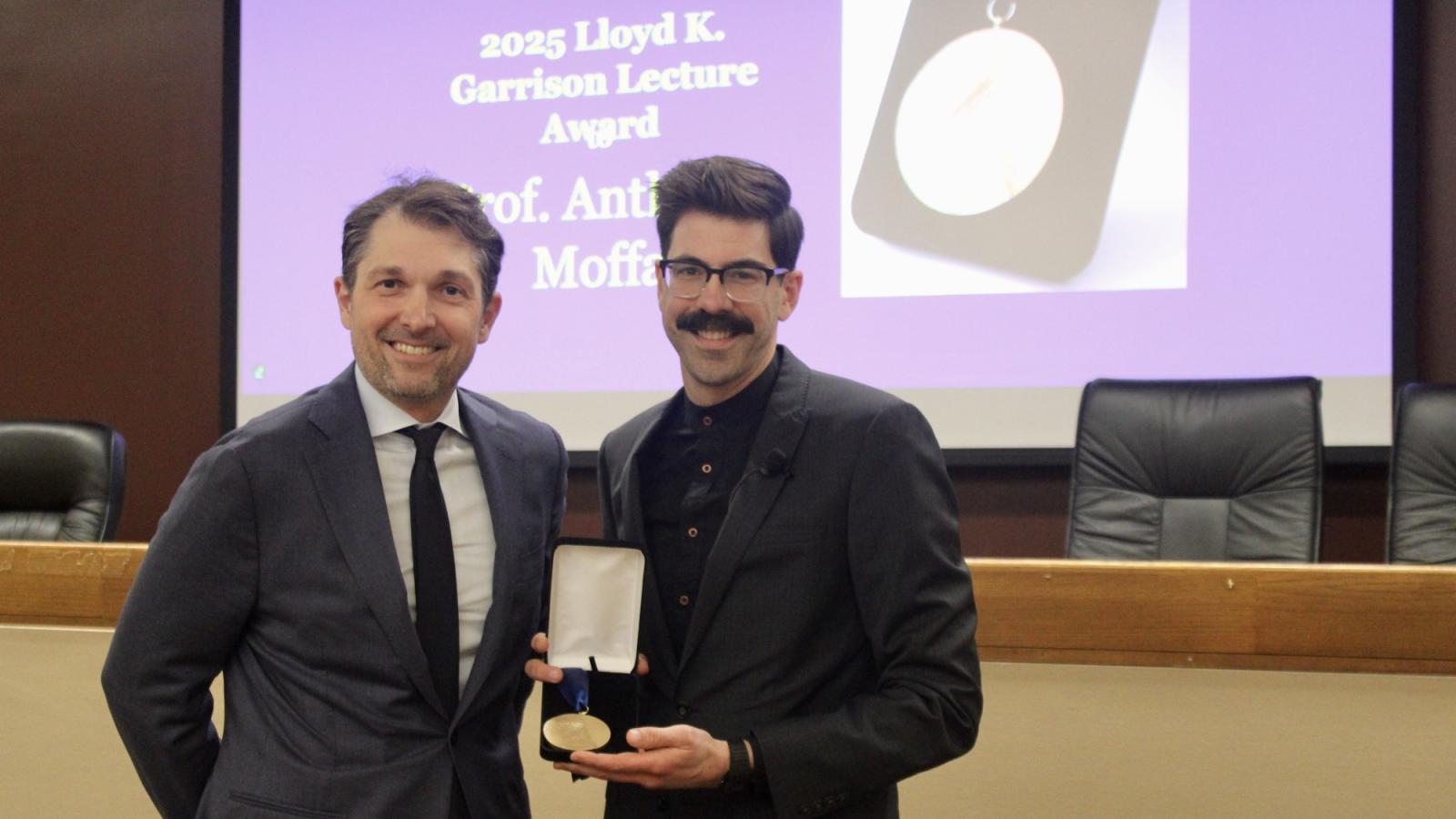
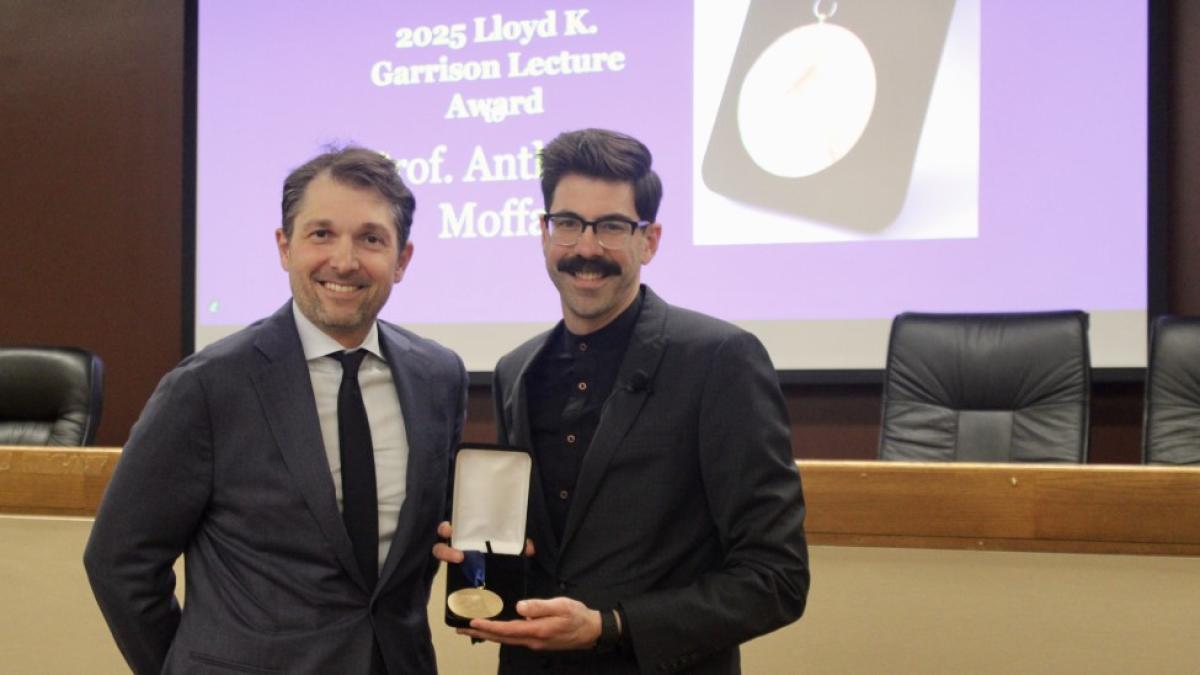
Professor Anthony Moffa delivered the Annual Lloyd K. Garrison Lecture on Environmental Law on Thursday, April 3 on "Back to the Future for Climate Liability." The Lloyd K. Garrison Lecture on Environmental Law was established in memory of Lloyd K. Garrison in 1995. Professor Anthony Moffa currently serves as a Haub Visiting Scholar at the Elisabeth Haub School of Law at Pace University. He is also a Professor and Associate Dean for Innovation at University of Maine School of Law, where he oversees the Environmental and Oceans Law Certificate Program.
During his timely and thought-provoking lecture, Professor Moffa explored pressing questions surrounding climate state superfund laws. Professor Moffa explained some of the history of climate change and pollution and detailed the actions of companies hiding the truth of the negative consequences of fossil fuels and other detrimental climate actions from the public, many actively spreading false information about the science of climate change. He went on to introduce and explain the polluter pays principle and eventually how the defining features of CERCLA began to come into focus. Professor Moffa examined if the climate superfund statutes that were put into effect were in fact cracking the three keystones of CERCLA liability – strict liability, retroactive liability, and joint and several liability. Looking ahead, he chronicled how Vermont and New York have already enacted laws holding fossil fuel producers strictly liable for the costs of adapting to and rebuilding from climate impacts, with several other states following close behind. Throughout his lecture, Professor Moffa posed and discussed imperative questions and analysis surrounding these issues. He questioned and theorized if these new laws can withstand the inevitable barrage of industry challenges in court.
Professor Anthony Moffa joined the University of Maine School of Law as a visiting associate professor in the fall of 2016. In 2023, he earned tenure and was promoted to the rank of professor of law. He also serves as the Associate Dean for Innovation and oversees the Environmental and Oceans Law Certificate Program. Professor Moffa is a broad and prolific environmental law scholar whose work has appeared in traditional and specialized journals (including the Utah Law Review, the Harvard Environmental Law Review, and the Stanford Environmental Law Journal), as well as books and popular media. That work has largely focused on trying to find novel approaches to addressing climate change within underexplored statutes, common law jurisprudence, historical practice, methods, and theory.
At Maine Law, Professor Moffa teaches environmental law courses and torts, and received the Professor of the Year Award in 2018 and 2021. Prior to joining the Maine Law faculty, Professor Moffa served in the General Counsel’s Office of the U.S. Environmental Protection Agency. He also clerked for Judge F. Dennis Saylor IV on the United States District Court for the District of Massachusetts and Judge Kermit Lipez on the United States Court of Appeals for the First Circuit in Portland. Professor Moffa graduated magna cum laude from the Wharton School of Business at the University of Pennsylvania and earned a law degree from Yale Law School.
To introduce the lecture, Vice Dean for Academic Affairs and Professor of Law Jill I. Gross provided the audience with the background of the Annual Lloyd K. Garrison Lecture on Environmental Law and the importance of the lecture to the Haub Law community. Jason J. Czarnezki, Kerlin Distinguished Professor of Environmental Law and Associate Dean for Environmental Law Programs and Strategic Initiatives at Haub Law, introduced Professor Anthony Moffa. Professor Jason Czarnezki also presented Professor Moffa with the Garrison Award and Medal. After the lecture, audience members had an opportunity to comment and ask questions and a reception immediately followed the Garrison Lecture.
Lloyd K. Garrison Lecture History
Over forty-five years ago, Lloyd K. Garrison and his associate, Albert K. Butzel, of Paul, Weiss, Rifkind, Wharton & Garrison, won the landmark decision to preserve Storm King Mountain on the Hudson River. This victory for the Scenic Hudson Preservation Conference did more than safeguard "an area of unique beauty and major historical importance" - it inaugurated what today we recognize as the field of environmental law.
Standing in court to protect nature, citizen suit legislation, the environmental impact statement process, and the balancing of economics with the preservation of scenic beauty and historic resources: these are all rooted in Scenic Hudson Preservation Conference v. Federal Power Commission, 354 F.2d 608 (2d Cir. 1965). The Lloyd K. Garrison Lecture celebrates the vision, public spirit and life of this attorney whose legal acumen led citizens in their successful advocacy of environmental quality at Storm King.
Press Release: Pace University to Premiere Viola da Terra Documentary at Jacob Burns Film Center
Pace University’s award-winning student documentary team – PaceDocs – will premiere their latest film, “Viola da Terra: Harmony of the Azores,” at 7:00 p.m. on Monday, May 5, 2025, at the Jacob Burns Film Center.
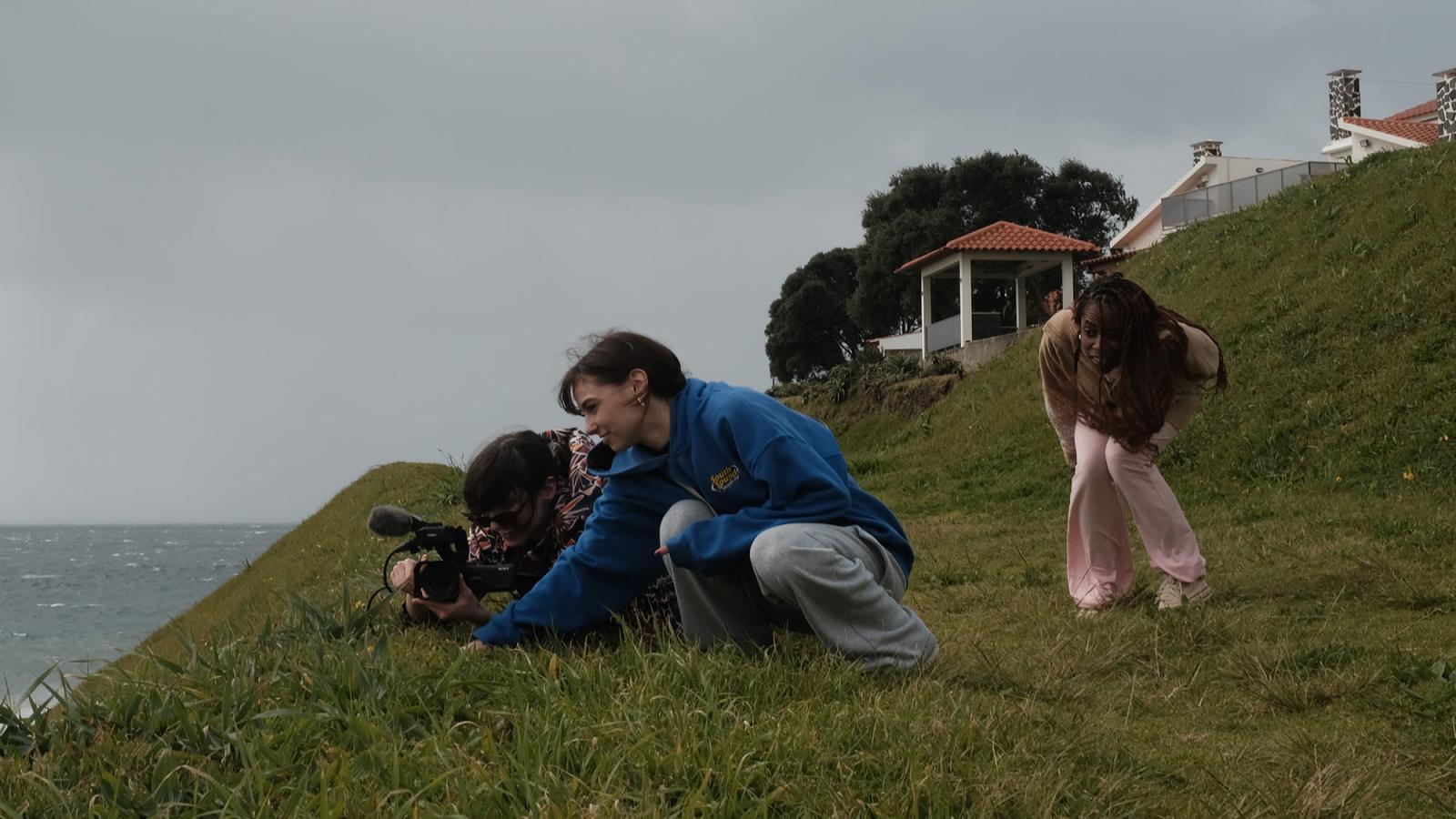
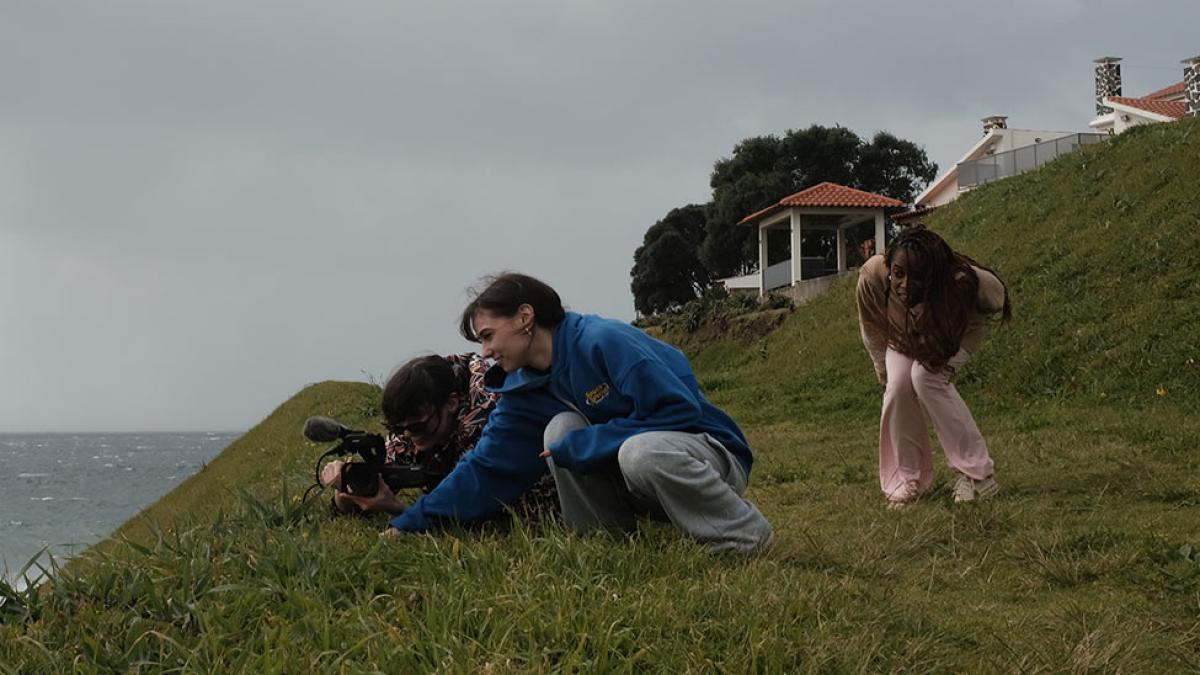
The PaceDocs team focuses film on the musical traditions of the Azores and the cultural legacy of the Viola da Terra
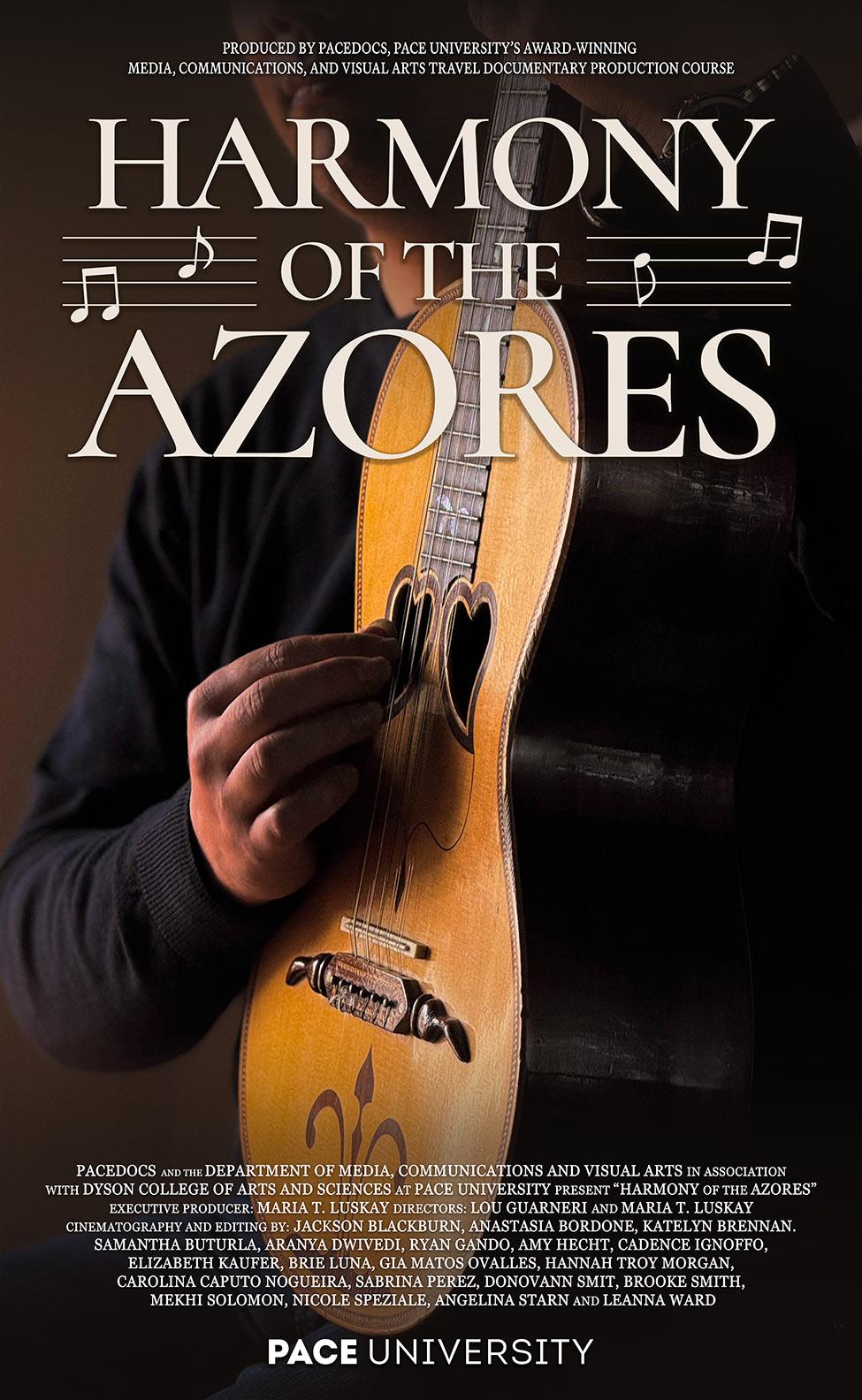
Pace University’s award-winning student documentary team – PaceDocs – will premiere their latest film, “Viola da Terra: Harmony of the Azores,” at 7:00 p.m. on Monday, May 5, 2025, at the Jacob Burns Film Center.
The documentary was filmed over spring break on the Azorean islands of São Miguel and Terceira, in Portugal. It explores the story of the Viola da Terra, a traditional 12–15 string instrument with deep roots in Azorean identity, music, and cultural preservation.
The documentary was produced by Dyson College of Arts and Sciences Professors Maria Luskay, EdD, and Lou Guarneri, and Pace University’s documentary film team.
Tickets for the reception and screening are available, though space is limited. (Use code PaceDocs25 for free tickets.)
“Viola da Terra is a moving exploration of music and identity that brings the story of the Azores to life through powerful voices and beautiful cinematography,” said Marvin Krislov, President of Pace University. “The PaceDocs team, under the leadership of Professor Maria Luskay EdD, has once again produced a professional, meaningful and timely film.”
The documentary is the focus of the popular class, “Producing the Documentary”, which is part of the. Dyson College of Arts and Sciences at Pace University’s highly regarded film program that requires students to complete a full-length environmentally themed documentary within 14 weeks. During the process, students learn teamwork, problem-solving, research, and organization, along with technical skills such as lighting, sound, camera work, interviewing, and other real-life lessons necessary to complete a film.
“From navigating travel between 2 of the Azores 9 islands to conducting complex interviews and editing in multiple languages, they’ve grown into real-world storytellers—and it shows in this film,” said Luskay.”
The PaceDocs crew split their time between the islands, beginning on São Miguel, where they filmed at Água d’Alto Beach, Sete Cidades and the Vila Franca do Campo Municipal Museum. In Ponta Delgada, they met with master musician Rafael Carvalho, visited his school and documented performances from students and local artists. They also toured a viola-making workshop led by artisan Hugo Raposo.
On Terceira, the team continued filming with interviews at City Hall with Mayor José Gabriel do Álamo de Meneses, who spoke about the importance of preserving Azorean heritage. Additional scenes were filmed at Escola Básica e Secundária Tomás de Borba, where music teacher Lázaro Silva and two students, Santiago Toste and Constança Santos, discussed their experiences playing the Viola da Terra. The trip concluded with a musical performance and community celebration at the Angra do Heroísmo Interpretive Center.
Made up of both graduate and undergraduate students, the team was deeply moved by the opportunity to collaborate on a film of professional quality.
“Working on Viola da Terra was a completely different but equally powerful experience,” said Jackson Blackburn, a senior in the combined BA/MA digital communication and media/multimedia program. “Having also been part of the PaceDocs team last year for The Cooper, I came into this project with a deeper appreciation for the process, but the cultural connection and emotion in the Azores brought something new. It reminded me why storytelling matters.”
“Viola da Terra” continues a proud tradition of producing high-quality, meaningful and award-winning films. In recent years, Pace filmmakers have produced documentaries from around the globe focusing on a number of topics, including the craft of barrel making in Spain (The Cooper, 2024), which received multiple international awards; the farm-to-table food movement in France (2023); how oysters depend on the ebb and flow of tides (2022); the importance of bees as pollinators in our food supply (2021); the impact of earthquakes in Hawaii (2019); the endurance of the people of Puerto Rico in the aftermath of Hurricane Maria (2018); Cuba at a cultural crossroads (2016); reviving Curacao’s coral reefs (2015); as well as many other poignant films.
“Once again this year, Dyson College’s student filmmakers have produced another fascinating documentary,” said Tresmaine R. Grimes, PhD, Dean of the Dyson College of Arts and Sciences and School of Education. “As they hone their craft, they also enlighten us to important issues across the societal spectrum. This year’s focus on the Viola da Terra in their work, Harmony of the Azores, reveals the importance of preserving cultural traditions and how this musical instrument is a symbol of the Azores’ musical heritage and a testament to its community’s spirit.”
About Dyson College of Arts and Science
Pace University’s liberal arts college, Dyson College, offers more than 50 programs, spanning the arts and humanities, natural sciences, social sciences, and pre-professional programs (including pre-medicine, pre-veterinary, and pre-law), as well as many courses that fulfill core curriculum requirements. The College offers access to numerous opportunities for internships, cooperative education and other hands-on learning experiences that complement in-class learning in preparing graduates for career and graduate/professional education choices.
About Pace University
Since 1906, Pace University has been transforming the lives of its diverse students—academically, professionally, and socioeconomically. With campuses in New York City and Westchester County, Pace offers bachelor, master, and doctoral degree programs to 13,600 students in its College of Health Professions, Dyson College of Arts and Sciences, Elisabeth Haub School of Law, Lubin School of Business, Sands College of Performing Arts, School of Education, and Seidenberg School of Computer Science and Information Systems.
The Importance of Professional Development: Alison Rebels, OTD, MS, OTR/L
For the next installment of our "Importance of Professional Development" series, we connected with Alison Rebels, OTD, clinical assistant professor for the Occupational Therapy, MS program.
This past fall, Alison presented at the New York State Occupational Therapy Association (NYSOTA) conference, sharing her research on spirituality in occupational therapy. Most recently, Alison was awarded the Pace University 2024 President's Award for Outstanding Contribution. We connected with her to learn more about the presentation process, and the importance of being passion.
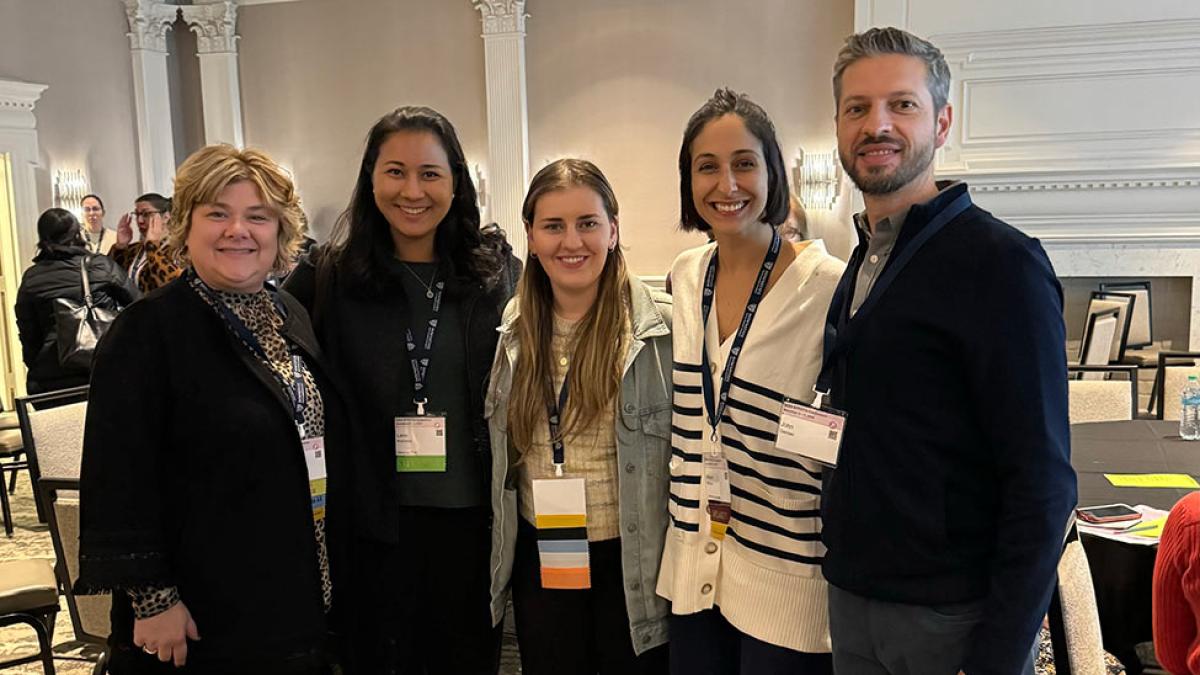
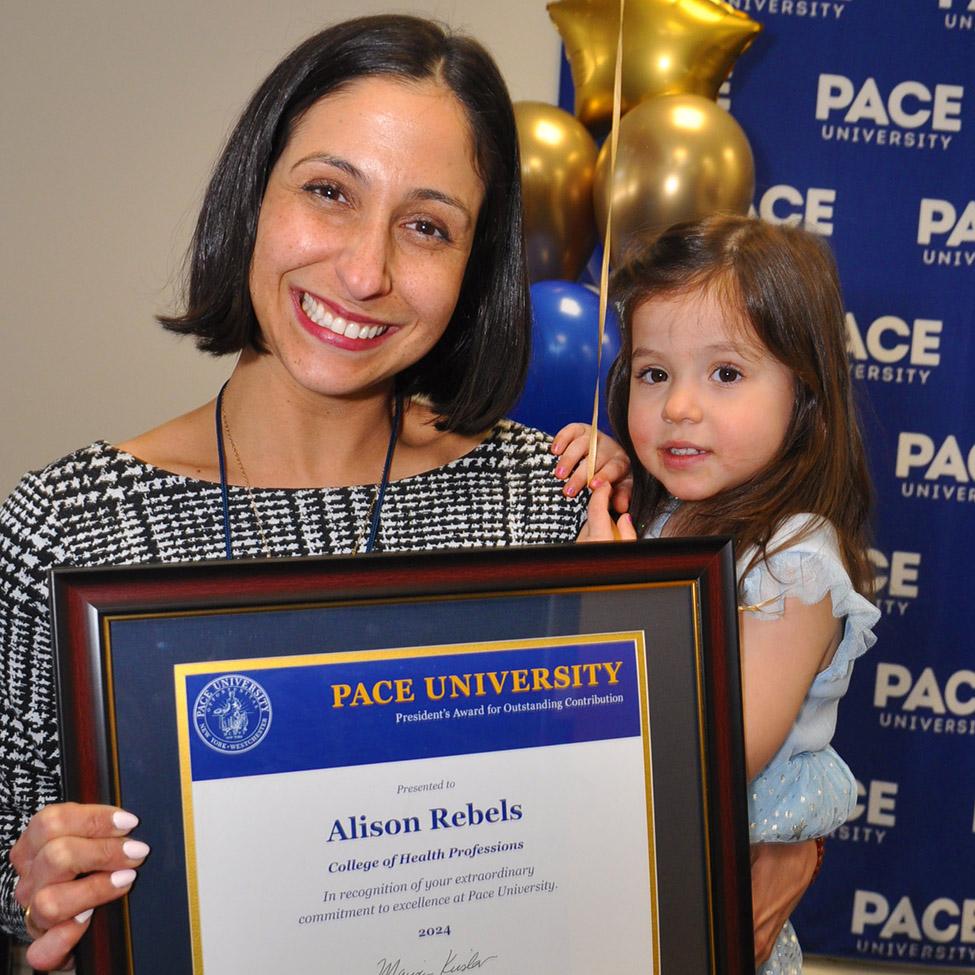
Alison Rebels, OTD, clinical assistant professor for the Occupational Therapy, MS program is a leader in her research on spirituality in Occupational Therapy (OT), and a highly involved member of the Pace community.
This past fall, Alison had the opportunity to host a workshop at the annual New York State Occupational Therapy Association (NYSOTA) conference on her research to Pace students and other OT professionals alike. We connected with her to learn more about the presentation process, and the importance of passion.
How did you get involved with NYSOTA?
As my passion for OT has grown, so has my desire to dive deeper into the heart and core of the profession. I see members of NYSOTA as change-makers—individuals committed to lifelong learning, leadership in the field, and ensuring the continued success of our profession. It’s a mission I feel both a professional responsibility and a strong desire to be a part of.
Why do you think it's important as a healthcare professional to attend conferences/engage with professional organizations like NYSOTA?
So many reasons! Being a part of NYSOTA allows me to participate in the conversation regarding regulations, laws, and policies that benefit and shape the future of OT. NYSOTA membership provides access to numerous resources to help me stay informed about best practices and the latest trends within the profession. For example, NYSOTA offers Communities of Practice where occupational therapists (OTs) specializing in or interested in different niches of the profession can connect and collaborate.
By engaging with all that NYSOTA has to offer, including attending conferences, I reap the benefits of professional growth, valuable connections, and a deeper appreciation for the wonderful field of OT.
What is the process of presenting at a conference like?
Typically, you submit a proposal months in advance, outlining a detailed description of your presentation topic and objectives for your session. If accepted, you are assigned a session format, which may include participation in a poster expo, facilitating an informal conversation on the topic, leading a short course, or conducting a longer workshop.
During the conference, multiple sessions usually take place simultaneously, and participants can choose to attend the sessions most relevant to their interests. The atmosphere is generally professional, yet friendly, engaging, and supportive.
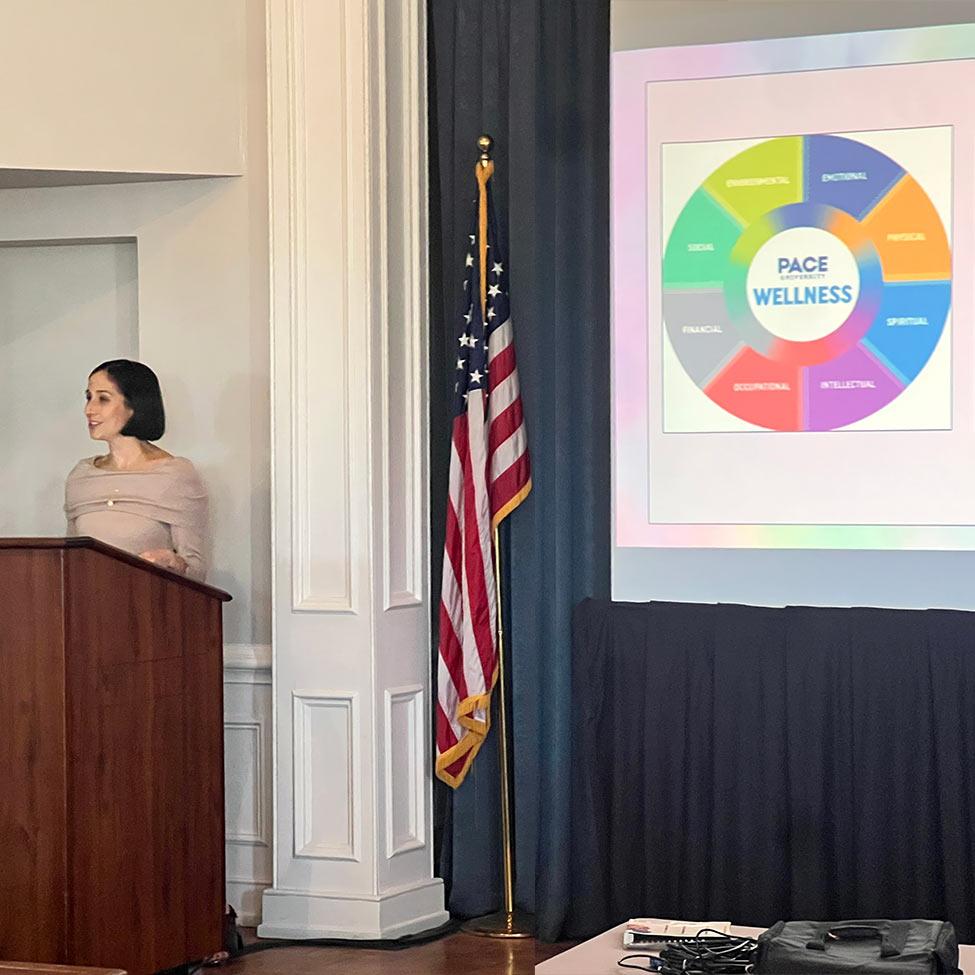
What did you present at the 2024 NYSOTA conference?
My presentation was titled “The SpiritualOT Journey: The Effectiveness of an 8-Week Workshop on Increasing Student Understanding of the Role of Spirituality in OT Practice.” I created and facilitated The SpiritualOT Journey, a workshop for second-year Pace University Master of Science in Occupational Therapy (MSOT) students during the Summer 2024 semester. The curriculum covered the history of spirituality in OT, evidence-based practices, and, most importantly, self-exploration of concepts related to the human spirit—such as meaning, authenticity, interconnection, intuition, and mindfulness. It is only through self-exploration of our own spirit that we can truly understand the personal nature and depth of the spirit of others.
My research revealed that the workshop enhanced students' understanding of their own spirituality and that of others, deepened their awareness of its relationship with OT, and increased their confidence in incorporating spirituality into OT treatment.
What inspired your research for "The SpiritualOT Journey"?
As a holistic profession, OTs consider the mind, body, and spirit; however, there is considerable uncertainty regarding the role of spirituality in OT and how to incorporate spirit into our treatment with clients. Spirituality is very much within our scope of practice. A spotlight needs to be placed on spirituality within our profession, as research indicates that incorporating spirituality into client care enhances health outcomes, well-being, and life engagement. I experience these benefits in my own life as I explore and nurture my own spiritual wellness. For me, this looks like journaling, mindful drawing, and yoga to quiet my mind and connect with my deepest, truest self.
By addressing the spiritual wellness of our clients, occupational therapists can support them in accessing inner healing, discovering meaning in life, living with purpose, and remaining true to their values and beliefs.
—Alison Rebels, OTD
To me, that is a beautiful professional role and responsibility that must not be neglected.
What is the biggest take away you hope students and OT professionals will have from your presentation?
I hope that those who attended my presentation left with a passion to advance the conversation regarding the importance of considering spirituality within OT and all areas of healthcare. I hope attendees left with an appreciation for the beauty of spirituality as a topic that is universal to humans, yet so deeply personal. One’s spirituality may be religious in nature, or it may not. It may be related to connectedness with a higher power, or to a connection to self, others, or nature. It may be related to one’s search for meaning, a motivating force, or a worldview. It is vital to consider our clients' spirituality and how it may act as a source of hope, comfort, purpose, and/or strength, particularly during times of challenge and transition.
Has your research topic influenced any of your teachings at Pace?
Yes! I created The SpiritualOT Journey and can’t wait to continue growing the program while learning alongside students and colleagues who embrace the importance of considering the mind, body, and spirit in healthcare.
Most recently, you were recognized with a Pace University President’s award. How does that feel?
I am deeply honored to be selected as a recipient of the 2024 President's Award for Outstanding Contribution. I’m so proud to be part of the Pace University community, and I am truly grateful for the opportunity to share my knowledge, passion, and heart with students who will go on to shape society, culture, and the world to come. As future healthcare professionals navigating both expected and unforeseen challenges, my wish is that students always return to the reason they chose this path—one most often rooted in their heart and their deep desire to support the healing of others.
Any additional details you'd like to share?
Special thanks are given to Dr. Beau Anderson, Dr. Sophie Kaufman, Dr. Jennifer Tokash, and Emmy Vadnais, OTR/L, who greatly enriched the workshop's content.
If you are interested in discussing this topic further, I would love to connect at arebels@pace.edu!
More from Pace
Jennifer Tokash, OTD is the academic fieldwork coordinator, and a clinical associate professor for the Occupational Therapy (OT), MS program.
We connected with her to learn more about her experience with NYSOTA, the importance of leadership, and her advice for students on their professional journeys.
Jason Slyer, DNP, RN, FNP-BC, CNL, FNAP, FNYAM is a family nurse practitioner (FNP) with over 20 years of experience in cardiac and chronic disease management. As a doctor of nursing practice (DNP)-prepared nurse practitioner, he is a leader and expert in evidence-based practice and translational research with scholarly interests in the area of shared decision-making in the promotion of person-centered care practices.
We connected with him to get his perspective on the LSN’s graduate programs as both a professor and former student.
The MSOT 2025 cohort took a field trip to Family of Kidz Sensory Gym in Harrison, NY, as part of their Pediatric course. The students learned about sensory integration in lecture and then participated in experiential learning to reinforce concepts and practice skills. This is learning. This is fun. This is occupational therapy and we love it! Happy World OT Day!
Building Her Own Blueprint
Julianna Vukaj ’26 is making her mark at Lubin as the founder of Women in Lubin and a leader across multiple student organizations. From launching new initiatives to championing collaboration, she’s focused on turning ideas into impact—and lifting others up along the way. Her journey shows that resilience, vision, and community go hand in hand.
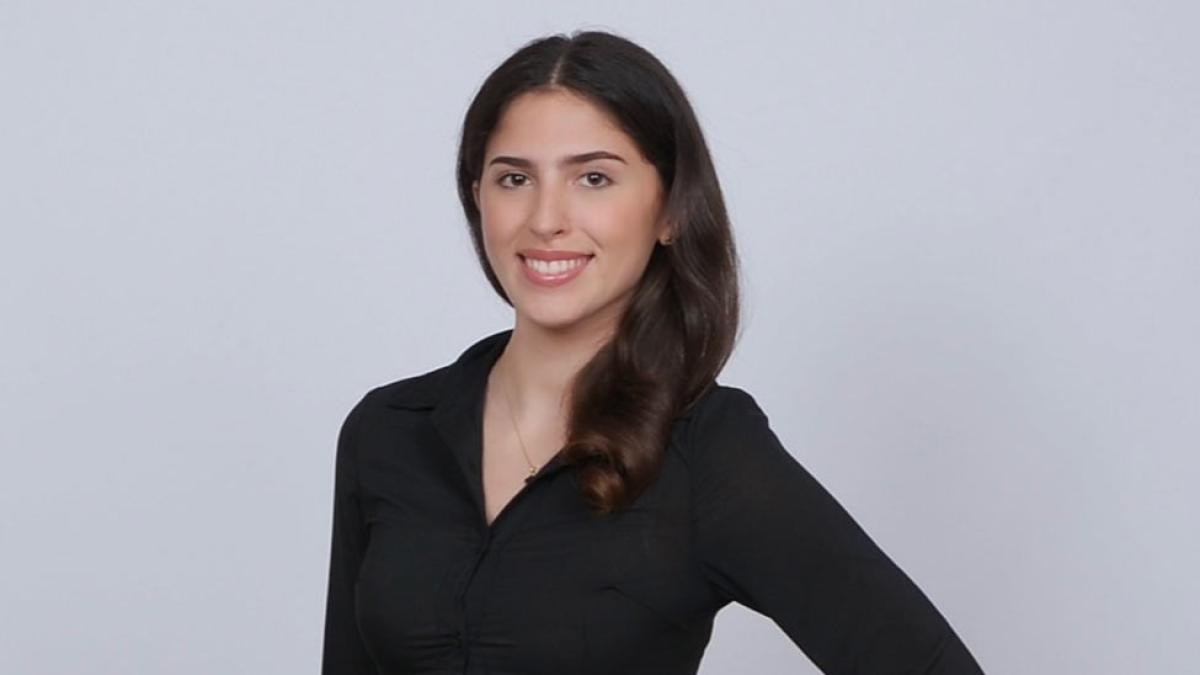
Julianna Vukaj
Class of 2026
Pronouns: she/her/hers
Currently Studying: BBA Finance, BS Economics
Member (Clubs): Founder and President of Women in Lubin, Investment Team Member, Chief Events Director for Honors Advisory Board (HAB)
Why did you choose Pace University and the Lubin School of Business?
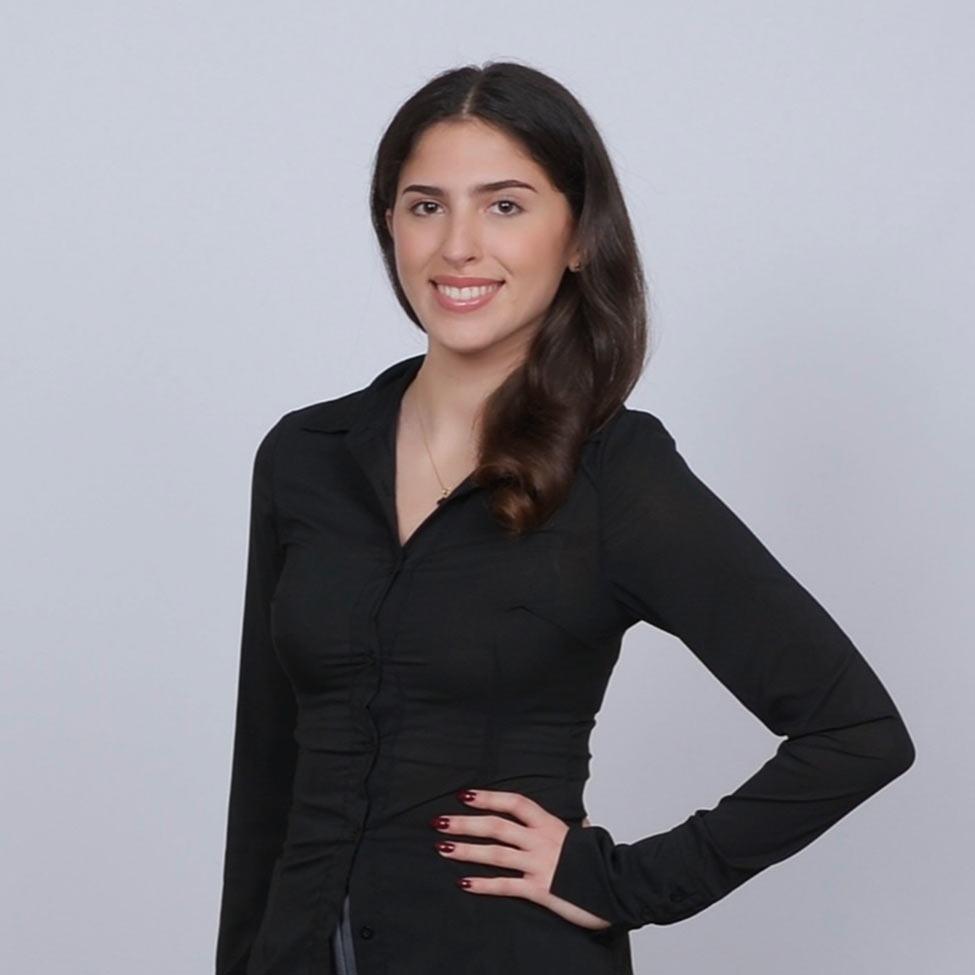
Having been born and raised in New York, I always knew I wanted to go to college in Manhattan. Interestingly, my sister graduated from Pace in 2013, so at first, I actually tried to make my own path and looked elsewhere. But when it came down to making a final decision—one that would provide real access to opportunities and resources to help me stand out in the business world—I found myself drawn to Pace and Lubin. Lubin has a reputation for strong internship and post-graduation career success rates, cutting edge facilities such as our Bloomberg Lab, notable professors who support you every step of the way, and—most importantly—being located at the center of the business world.
How have clubs on campus helped enrich your student experience?
Aside from having the opportunity to found an organization, existing clubs on campus have tremendously enriched my experience. As Chief Events Director of the Honors Advisory Board—an organization run through the Pforzheimer Honors College—I’ve had the opportunity to lead a team that creates exclusive events for 750 honors students and contributes to delivering a distinguished honors experience, all while building my leadership capabilities. Additionally, being on the Investment Team has allowed me to surround myself with like-minded individuals I can learn from and engage with in market-driven discussions—contributing directly to my goals for a future career.
What inspired you to create Women in Lubin?
A “Women in Business Society” was the first thing I searched for when I came to Pace, and I knew we had to have one—especially since Pace was initially founded as a business school. It only made sense to create an environment where undergraduate women studying business could connect and work toward a common goal: breaking into male-dominated industries. Although I was happy to see we had other women’s groups, it turned out we didn’t have one that specifically represented women business majors or catered to their needs. That’s what led to the idea of creating the organization from scratch.
What have been the major takeaways from your current role as President of Women in Lubin?
One of the biggest takeaways from my role as President of Women in Lubin has been learning how to turn rejection into redirection. The first time my e-board and I pitched our organization, it was rejected—we needed more structure, stronger ideas, and a clearer niche. It was disheartening, but instead of walking away, we took the feedback seriously and spent the next semester building a brand that couldn’t be overlooked. We developed a social media presence, connected with potential event speakers, and refined our mission to reflect what was missing on campus. After receiving approval and launching 18 successful events in our first semester, I’ve learned that resilience is just as important as vision—and sometimes, it’s not about changing the goal, just the approach.
How has being a member of the Pforzheimer Honors College benefitted you?
Being a member of the Pforzheimer Honors College has allowed me to attend exclusive honors events and build close relationships with friends and professors in my honors courses. Most significantly, the Honors College has helped me thrive in what I’d call a “small pond, big fish” environment—where I’ve had the chance to stand out, take on leadership roles, and contribute meaningfully to my community.
You’re Chief Events Director of the Pforzheimer Honors College, what has been the most rewarding part of this position?
The most rewarding part of being Chief Events Director has been the opportunity to shape—and be part of—a team where everyone’s creative ideas are heard and valued. From brainstorming themes to executing final details, I’ve learned that the best events come from open communication and mutual respect. Helping our team grow together and take pride in what we create has made this role especially meaningful.
What has been your favorite opportunity at Pace?
There are numerous opportunities I’d characterize as stellar; however, my favorite has been founding and launching Women in Lubin with an amazing e-board. With support from the Office of Student Engagement and the Lubin School of Business, we had a successful first semester and laid the groundwork for a lasting organization.
Do you have any advice for other Lubin students?
My greatest piece of advice for Lubin students is to keep up with events and programs hosted by Lubin and its student organizations. You’d be surprised at the opportunities and ideas that can come from simply having conversations with peers and professors in the Lubin community.
What does #LubinLife mean to you?
In my experience, #LubinLife has meant not only being surrounded by people who strive for success—but also by those who lift others up along the way. For that, I am truly grateful.
Connect with Julianna:
Building with Purpose: From Wall Street to AI Startups
When Vidhi Kothari ’25 began her journey at Pace University, she didn’t expect to become the founder of a startup. But what she did know, was that she wanted to create meaningful value in the world. That desire—to build, to contribute, and to empower through employment—became the foundation for her path as an entrepreneur.


When Vidhi Kothari ’25 began her journey at Pace University, she didn’t expect to become the founder of a startup. But what she did know, was that she wanted to create meaningful value in the world. That desire—to build, to contribute, and to empower through employment—became the foundation for her path as an entrepreneur, innovator, and student in Pace’s BS in Computational Economics program at the Dyson College of Arts and Sciences and the Seidenberg School of Computer Science and Information Systems.
“I realized early on that the more skin I had in the game, the more driven I became,” Vidhi said. At Pace, she found the freedom to explore a wide range of interests, from cybersecurity to finance, renewables, and healthcare. This multidisciplinary experience helped her shape her understanding of what it takes to build and innovate in the real world. Now, Vidhi is building Pigeon, a tool for developers that makes it easy to deploy AI agents to automate workflows for enterprises.
From Wall Street to a Computational Mindset
Since New York is the finance capital of the world, Vidhi naturally gravitated toward the finance industry at first as she spent summers in sales, trading, and investing. "In New York, finance is everywhere," she said. "But I didn’t want to just analyze systems—I wanted to build them."
This realization as a junior at Pace led her to pivot into tech and startups, seeking out innovation in those industries and figuring out ways to bring societal impact through them. Switching majors to Computational Economics was, in Vidhi’s words, a “game-changer.” The program allowed her to merge two worlds—finance and coding—giving her the tools to tackle complex, real-world problems through a technical lens.
The program deepened my understanding of how data drives decisions and innovation in fast-moving industries. It gave me the technical chops to thrive in the startup world.
Connecting Energy, Cybersecurity, and AI
Settled into her new major, Vidhi began examining financial incentives for energy companies in the Southeastern U.S. during a Dyson Summer Research project. But the work led her somewhere she hadn’t anticipated: cybersecurity. “I realized that securing infrastructure was just as critical as the transition to clean energy,” Vidhi said. That insight led her to a cybersecurity class taught by Professor Joe Acampora—and eventually to an internship at Copia Automation, a Series A industrial automation startup.
In that cybersecurity course, a light bulb went off. Vidhi discovered how edge computing could secure industrial systems more efficiently than traditional cloud-based models. “We explored how digital twins and AI agents could detect anomalies at the edge,” she said. “It was a whole new way of thinking about infrastructure protection—decentralized, reliable, and secure.”
An Applied AI course was another key experience in Vidhi’s Pace journey as her machine learning-based solar forecasting project used LSTM (Long Short-Term Memory) networks and further deepened her focus on energy optimization. The project focused on reducing energy costs, and while the group didn’t meet their original goal, it gave Vidhi invaluable insights into how inefficiencies in energy management can have real financial impact.
A Startup is Born
Vidhi’s experience across industries prepared her for what came next: launching Pigeon, a startup that helps enterprises deploy AI agents more efficiently to tackle complex challenges. The inspiration came while working at different startups, where she noticed a surprising problem:
Everyone was building AI agents—but no one was solving how to deploy them.
A conversation with a friend at Bell Labs in Munich crystalized the potential of this opportunity, leading to the birth of Pigeon. Vidhi has a very clear idea of how this startup can change the world: “Think Jarvis from Iron Man. Pigeon is making AI agents a reality, seamlessly integrating them into industries to automate workflows and solve problems like never before.”
A Go-Getter in Action
Vidhi’s path from finance to tech, from student researcher to startup founder, reflects not only her personal ambition but also the kind of multidisciplinary, forward-looking education that defines a Pace Go-Getter. Along this rewarding personal journey, Vidhi’s biggest breakthrough came from realizing that true innovation doesn’t just mean pushing forward, but often requires stepping back and rethinking the problem at hand, building it from a different angles. This is a mindset that she intends to carry into all of her future projects, and that she encourages in others looking to make their mark in tech. “Take risks. The more you invest in an idea, the more meaningful your impact will be.”
U.S. News and World Report Increases Ranking for Pace MPA Program as a Best Graduate Public Affairs School
Pace’s Master of Public Administration (MPA) program has been recognized by the U.S. News & World Report (USNWR)’s 2025 rankings as one of the Best Graduate Public Affairs Schools, an increase in 61 spots since 2019, and reflecting the Public Administration Department’s growing impact in public service education through the excellent work of faculty and students.
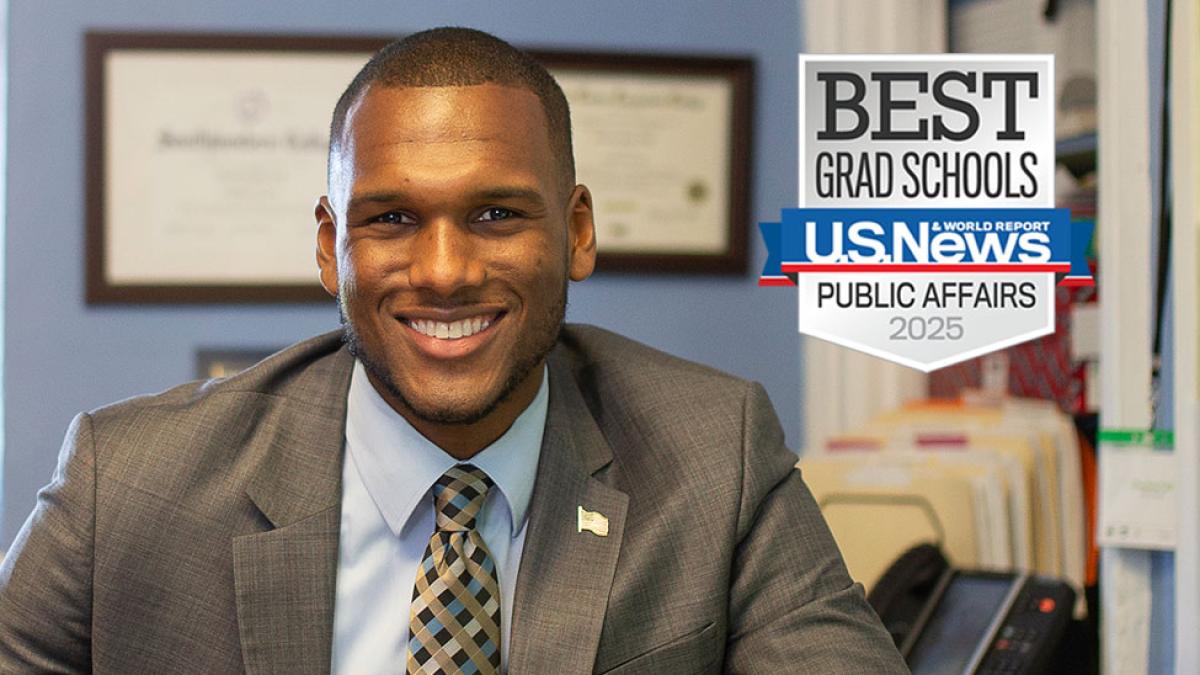
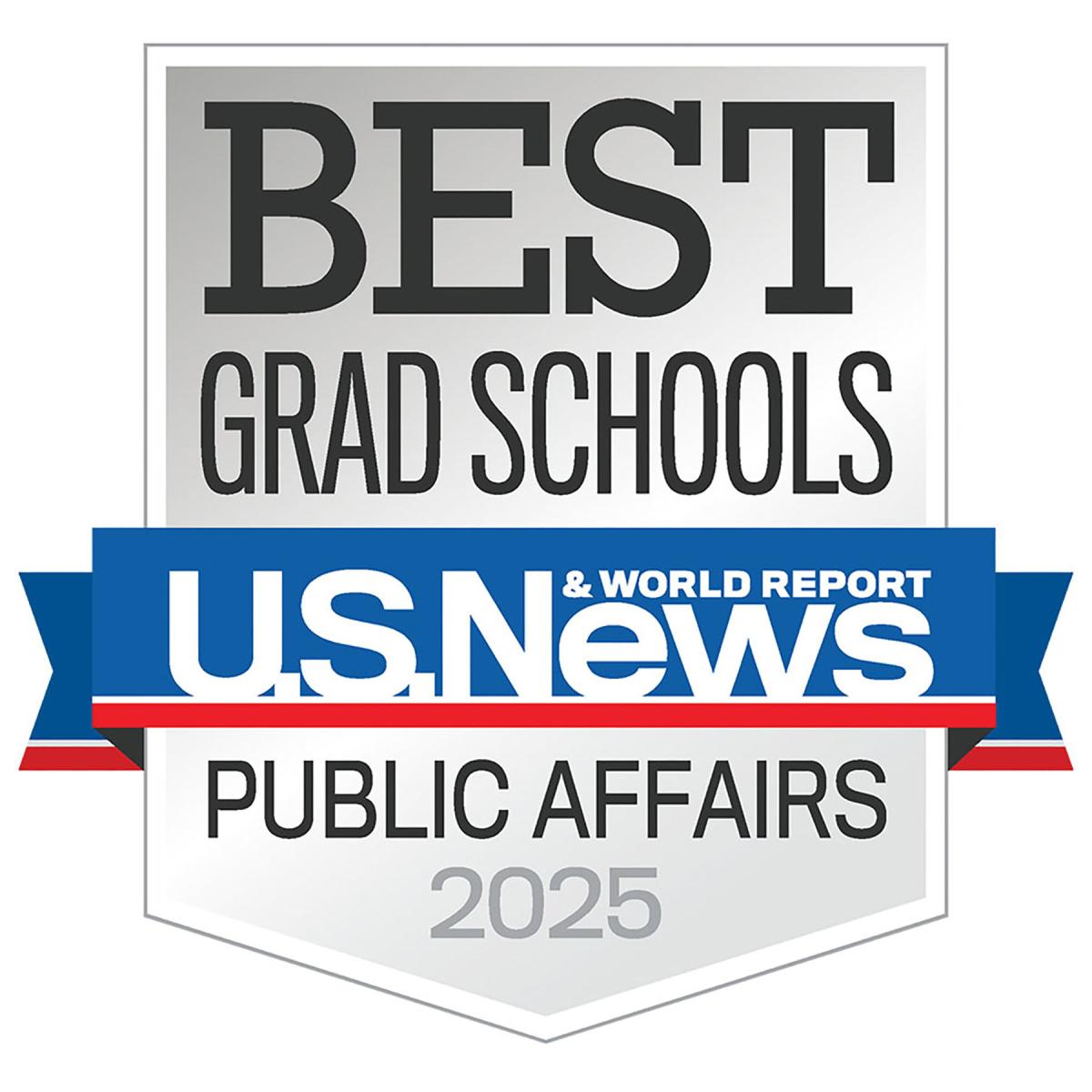
Pace’s Master of Public Administration (MPA) program has been recognized by the U.S. News & World Report (USNWR)’s 2025 rankings as one of the Best Graduate Public Affairs Schools, an increase in 61 spots since 2019, and reflecting the Public Administration Department’s growing impact in public service education through the excellent work of faculty and students.
“While USNWR is one of the many indicators to measure the quality and reputation of our public affairs education, earning this important milestone is a huge accomplishment for our small but mighty department,” said Gina Scutelnicu Todoran, PhD, chair and professor of the Public Administration program.
The STEM-designated, interdisciplinary MPA curriculum at Pace offers flexibility across sectors such as government, healthcare, and nonprofits, and the program was one of the first in the nation to integrate experiential learning and a strong public service focus. Hands-on experiences allow students to gain practical skills, engage in policymaking, build professional networks, and make a meaningful impact in their communities.
Scutelnicu-Todoran, also chair of the Northeast Conference on Public Administration (NECoPA), and recent recipient of the 2025 Rita Mae Kelly Distinguished Research Award, has collaborated over the years with MPA Professor and Interim Associate Provost Rebecca Tekula, PhD, to drive meaningful change in various communities through grants and external Pace partnerships.
Examples include a nearly $30,000 grant by the Council of Family and Child Caring Agencies to assess the financial status of approximately 75 New York State agencies under its umbrella; conducting a new comprehensive survey targeting the Latino community, with the Hispanic Advisory Board, and under the leadership of Westchester County Executive George Latimer; and identifying, along with other MPA faculty, mental health, counseling, substance abuse, and suicide prevention services needed in lower Westchester through a partnership with The Community Fund.
MPA student-faculty research has also enabled students to turn real-life research into impactful advocacy, with the program’s alumni, such as Andrea Grenadier ‘16, succeeding in rewarding careers that demonstrate the value of the program.
With its enrollment continuing to grow, we expect to see many more students and alumni thriving in careers in the public sector where they will make significant contributions to the world we live in.
Pace University Lifeguards Rescue Man Who Experience Cardiac Arrest In Pool
ABC7 New York highlighted the heroic actions of two Pace University student lifeguards who sprang into action when alumnus Bryan Zirman went into cardiac arrest at the campus pool. Thanks to their fast response and life-saving skills, a tragedy was averted.
Is DOGE Legal? For Some Agencies the Final Word Might Not Matter
Elisabeth Haub School of Law Professor Josh Galperin speaks with Bloomberg Law on the recent DOGE ruling, critiquing the court’s narrow reading of Elon Musk’s authority.
